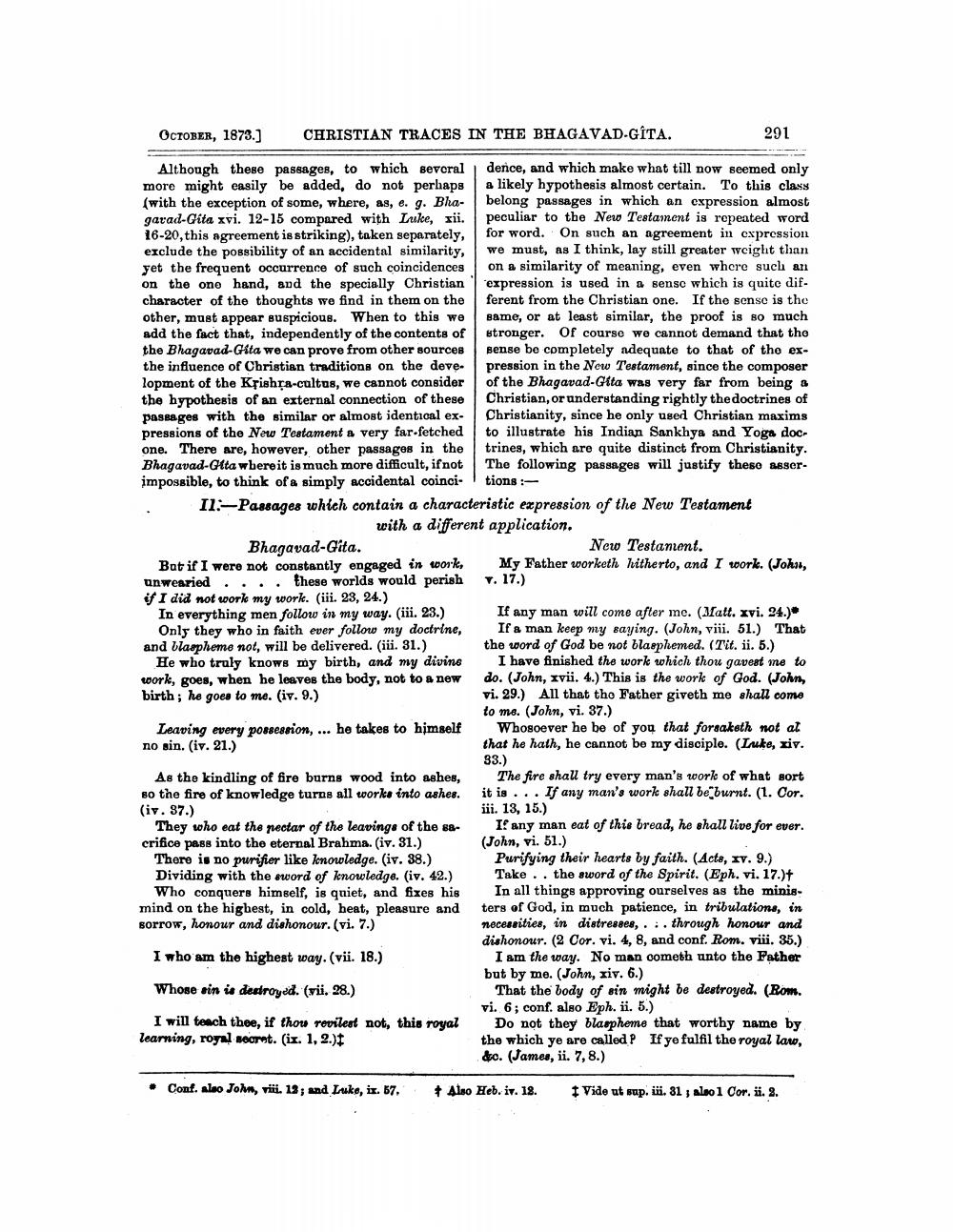________________
CHRISTIAN TRACES IN THE BHAGAVAD-GITA.
OCTOBER, 1873.]
Although these passages, to which several more might easily be added, do not perhaps (with the exception of some, where, as, e. g. Bhagavad-Gita xvi. 12-15 compared with Luke, xii. 16-20, this agreement is striking), taken separately, exclude the possibility of an accidental similarity, yet the frequent occurrence of such coincidences on the one hand, and the specially Christian character of the thoughts we find in them on the other, must appear suspicious. When to this we add the fact that, independently of the contents of the Bhagavad-Gita we can prove from other sources the influence of Christian traditions on the deve lopment of the Krishṛa-cultus, we cannot consider the hypothesis of an external connection of these passages with the similar or almost identical expressions of the New Testament a very far-fetched one. There are, however, other passages in the Bhagavad-Gita where it is much more difficult, if not impossible, to think of a simply accidental coinci
Il-Passages which contain a characteristic expression of the New Testament with a different application.
Bhagavad-Gita.
But if I were not constantly engaged in work, unwearied.... these worlds would perish if I did not work my work. (iii. 23, 24.)
In everything men follow in my way. (iii. 23.) Only they who in faith ever follow my doctrine, and blaspheme not, will be delivered. (iii. 31.)
He who truly knows my birth, and my divine work, goes, when he leaves the body, not to a new birth; he goes to me. (iv. 9.)
Leaving every possession, ... he takes to himself no sin. (iv. 21.)
As the kindling of fire burns wood into ashes, so the fire of knowledge turns all works into ashes. (iv. 87.)
They who eat the nectar of the leavings of the sacrifice pass into the eternal Brahma. (iv. 31.)
There is no purifier like knowledge. (iv. 38.) Dividing with the sword of knowledge. (iv. 42.) Who conquers himself, is quiet, and fixes his mind on the highest, in cold, heat, pleasure and sorrow, honour and dishonour. (vi. 7.)
I who am the highest way. (vii. 18.)
Whose sin is destroyed. (vii. 28.)
I will teach thee, if thou revilest not, this royal learning, royal secret. (ix. 1, 2.)
* Conf. also John, viii. 12; and Luke, ix. 57.
dence, and which make what till now seemed only a likely hypothesis almost certain. To this class belong passages in which an expression almost peculiar to the New Testament is repeated word for word. On such an agreement in expression we must, as I think, lay still greater weight than on a similarity of meaning, even where such an expression is used in a sense which is quite different from the Christian one. If the sense is the same, or at least similar, the proof is so much stronger. Of course we cannot demand that the sense be completely adequate to that of the expression in the New Testament, since the composer of the Bhagavad-Gita was very far from being a Christian, or understanding rightly the doctrines of Christianity, since he only used Christian maxims to illustrate his Indian Sankhya and Yoga doctrines, which are quite distinct from Christianity. The following passages will justify these assertions:
291
New Testament.
My Father worketh hitherto, and I work. (John, v. 17.)
If any man will come after me. (Matt. xvi. 24.)* If a man keep my saying. (John, viii. 51.) That the word of God be not blasphemed. (Tit. ii. 5.)
I have finished the work which thou gavest me to do. (John, xvii. 4.) This is the work of God. (John, vi. 29.) All that the Father giveth me shall come to me. (John, vi. 37.)
Whosoever he be of you that forsaketh not al that he hath, he cannot be my disciple. (Luke, xiv. 33.)
The fire shall try every man's work of what sort it is... If any man's work shall be burnt. (1. Cor. iii. 13, 15.)
If any man eat of this bread, he shall live for ever. (John, vi. 51.)
Purifying their hearts by faith. (Acts, xv. 9.) Take the sword of the Spirit. (Eph. vi. 17.)+ In all things approving ourselves as the ministers of God, in much patience, in tribulations, in necessities, in distresses,... through honour and dishonour. (2 Cor. vi. 4, 8, and conf. Rom. viii. 35.)
I am the way. No man cometh unto the Father but by me. (John, xiv. 6.)
That the body of sin might be destroyed. (Rom. vi. 6; conf. also Eph. ii. 5.)
Do not they blaspheme that worthy name by the which ye are called? If ye fulfil the royal law, &c. (James, ii. 7, 8.)
Vide ut sup. iii. 31; also 1 Cor. ii. 2.
Also Heb. iv. 18.




